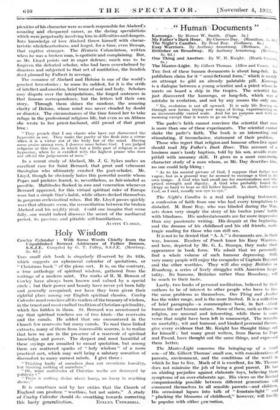- - Huinah Documents"
Kamongo. By Homer W. Smith. (Cape. Ss.)
3s. a(1.)
The Master-Light. By Gilbert Thomas. (Allen and Unwin. 5s.) THE first of these human documents is about lung-fish. Its publishers claim for it "semi-fictional form," which is merelV an attempt to gild an already palatable pill. Kainonty is a' dialogue between a young scientist and a priest whom he meets on board a ship in the tropics. The scientist has' just discovered the kamongo, or lung-fish, which was a4 mistake in evolution, and not by any means the only one.'
"No, evolution is not all upward. It is only life flowing out through new forms, trying new ways of living, experimenting on an inconceivably varied scale. And for no purpose and with no meaning except that it wants to go on living.
The padre's faith cannot convince the scientist that man is more than one of these experiments. The scientist cannot shake the padre's faith. The book is an interesting and stimulating, if inconclusive, statement of their problem.
Those who regret' that religion and humour often live apart should read My Father's Dark Hour. This account of a-
business man's tardy baptism, told by his son, avoids every pitfall with uncanny skill. It gives us a most convincing character study of a man whom, as Mr. Pay describes him, no one could help liking :
"As to his mental picture of God, I suppose that father was' vague, but in a general way he seemed to envisage a God in his own image. A God who had small use for emotionalism and who prized strength and dignity. A God who probably found the clergy as hard to bear as did father himself. In short, father and God, as I said, usually saw eye to eye."
The Night's Candles is a real and inspiring testament, a confession- of faith from one who had every temptation to disbelief. M. Rene Roy, who was blinded during the War, sets down very simply the story of his twelve years' battle with blindness. His understatements are far more impressive than any passionate writing. His despair at the beginning, and the dreams of his childhood and his old friends, make
tragic reading for those who can still see.
It is not to be denied that "A. A." 's documents are, in their
way, human. Readers of Punch know his Easy 'Warriors, and here, -depicted by Mr. G. L. Stamps, they .make their appearance in book form. We admit that we personally find a whole volume of such humour. depressing. Still, very many people will enjoy the escapades of Captain Bayonet and the other worthies.. They will also enjoy ,Brifisher on
Broadway, a series of lively struggles with American hospi- tality. Its humour, Britisher rather than Broadway, will be much to their taste.
Lastly, two books of personal meditation, believed by their authors to be of interest to other people who have to fare the same problems as themselves. One Thing and Another has the wider range, and is the more limited. It is a collection of brief paragraphs--a commonplace book, in fact—about human life and human nature. Some of them, such as those on
religion, are unusual and interesting, while there is some verse that might have been left in manuscript. The remarks on mortality, wit and humour, and kindred perennial themes, give every evidence that Mr. Knight has thought things out for himself : but many great writers, from Bacon to Pope and Pascal, have thought out the same things, and expressed them better.
The Master-Light concerns the bringing-up of a small
son—of Mr. Gilbert Thomas' small son, with considerations of parents, environment, and the conditions of the world in
which he has to live. Much of it is excellent, for Mr. Thomas does not minimize the job of being a good parent. He has an abiding prejudice against elaborate toys, believing them symptoms of an over-elaborate age. His views on the limited companionship possible between different generations will commend _themselves to all sensible parents—and children. His occasional lapses into talk of " fountain-light " and "plucking the blossoms of childhood," however; will hardly be popular with either Lemration.










































 Previous page
Previous page